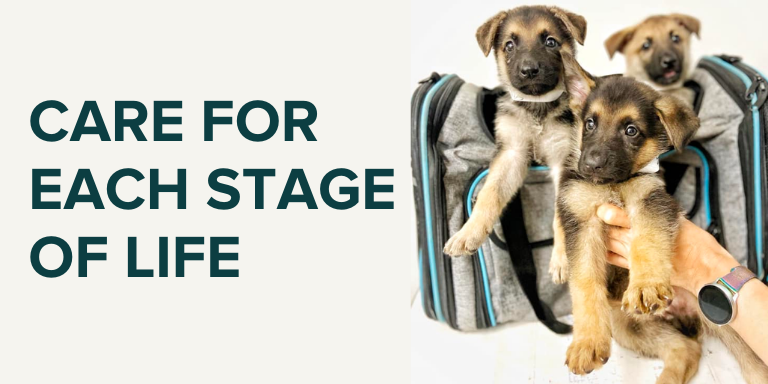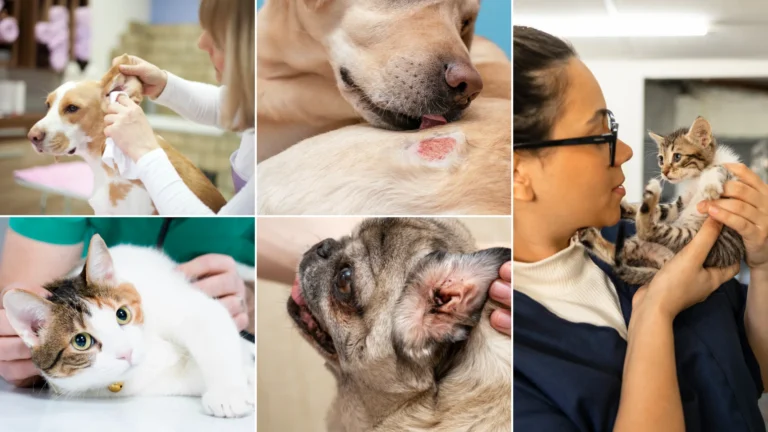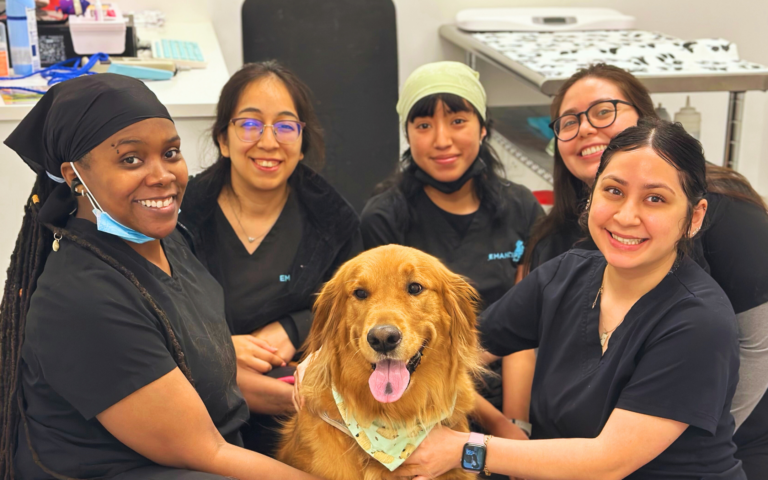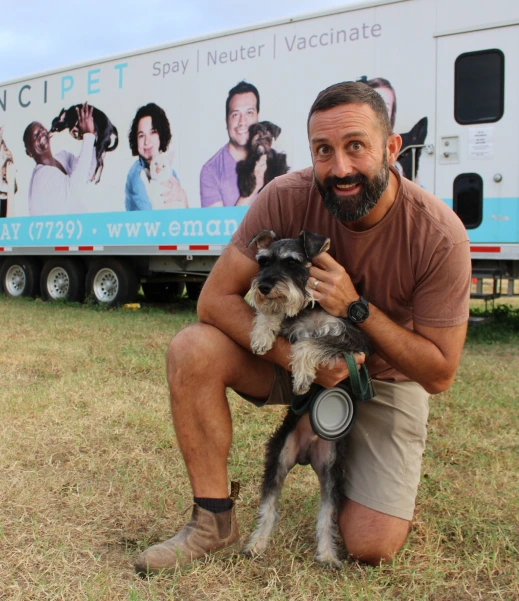From new puppies and kittens to an adopted senior pet, all animals will require some level of veterinary care throughout their lives. Whether they are young, old, sick or healthy, this article will go over what vet care your pet will need during each stage of life and how nonprofit veterinary services, like Emancipet, can help!
The 3 Life Stages For Dogs And Cats – What Are They?
Just like all creatures big and small, dogs and cats go through several different life stages as they age. Starting off as puppies or kittens, they transition into adulthood where they eventually become seniors.
The age range varies for canines as the life expectancy depends on their breed and size. Small dogs can live anywhere from 15 – 18 years of age and a medium or large dog will usually live to be between 11 – 14 years. Giant breeds, also known as the “heartbreakers” because they pass at relatively young ages, can live to be between 6 – 10 years old.
Cats have far less selective breeding, meaning that you can expect the average feline to live for around 12 – 18 years.
What Vet Care Do Puppies And Kittens Need?
Puppies and kittens are slightly more vulnerable as they have weaker and less hardy immune systems. This is why vaccinating your young pet is so crucial to their overall health and well-being. Vaccinations are extremely important as they protect your puppy or kitten from preventable and potentially life-threatening viruses and diseases.
The vaccinations should be given to your puppy or kitten on a specific schedule. Starting at 7-8 weeks, they will receive 3-4 rounds of vaccination boosters 3-4 weeks apart, ending at 16 weeks of age or older when they receive their final booster. Rabies vaccines can be administered no sooner than 12 weeks of age, and the first rabies vaccine administered is good for one year.
Recommended Core Vaccines For Puppies
- DAP: helps protect puppies and dogs against many diseases including Canine Parvovirus, Canine Distemper Virus, and respiratory disease caused by Canine Adenovirus type-2.
- Leptospirosis: protects against leptospirosis, a bacteria that can be passed to humans.
- Rabies: protects against the fatal rabies virus. Required by law in many US states and countries throughout the world.
- Bordetella: also known as “kennel cough”. Protects against common upper respiratory bacteria and viruses that cause kennel cough, which is most commonly transmitted at dog parks, groomers, and boarding facilities.
- Lyme: a non-core vaccine that is only recommended in areas where ticks and lyme disease are commonly seen. Using a reputable monthly flea and tick prevention is also a good way to avoid lyme disease. This is not currently offered at Emancipet clinics.
Recommended Core Vaccines For Kittens
– FVRCP: protects against feline viral rhinotracheitis, calicivirus and panleukopenia.
– Feline leukemia: protects against feline leukemia, the leading cause of death among cats (next to trauma).
– Rabies
At Emancipet, your puppy or kitten can receive a full exam by one of our veterinarians for as little as $20! They will go over your pet’s health and give you the appropriate recommendations right there on the spot!
And don’t forget: most puppies under the age of 6 months should be fed frequently (3-6 times per day), rather than once or twice a day like adult dogs. Check the food that you are feeding your pup: they should be on a diet specifically formulated for puppies.
Spaying And Neutering Puppies And Kittens
There is a fair amount of debate online about when the proper age to spay and neuter a dog is. With cats, people seem to have less of a fixed opinion. While there are a lot of conflicting thoughts on the matter, the best course of action you should take is to simply listen to what your veterinarian recommends.
Many veterinary professionals recommend having your puppy or kitten spayed/neutered between the ages of 4 and 6 months. Going beyond that time frame puts your pet at risk of developing hormones that can cause mammary tumors or potentially fatal uterine infections, not to mention unwanted pregnancies and marking behavior.
What Vet Care Do Adult Dogs And Cats Need?
Adult dogs and cats will typically receive less veterinary care than a very young or senior pet. This is because, assuming they are healthy, they should really only need to be seen once, or twice yearly, at most.
Most annual vet visits will include:
– Physical exam
– Vaccine boosters
– Parasite testing
– Heartworm testing (more specifically in dogs)
– Feline leukemia and FIV (feline HIV) test for cats who venture outdoors
– Leave the vet with heartworm/flea/tick prevention
* Dental care is another necessity, as all dogs and cats should have their teeth professionally cleaned and examined for any periodontal disease or teeth that need to be removed. Anesthetized dental cleanings and extractions are offered in certain Emancipet clinics- please call our Resource Center for more information.
Dogs should be tested annually for heartworm disease and maintained on a heartworm prevention year round once a negative test is confirmed. Yearly fecal exams to test for intestinal parasites is important for both dogs and cats as well. It is always possible that your super clean, indoor pet can pick up an unwanted parasite. Please note that Emancipet only offers fecal exams for dogs that are heartworm positive.
When your adult dog or cat is at the vet, it is important to discuss any concerns or questions you may have in order to ensure that your pet has the most accurate history and exam possible. Finding signs of disease or illness early is key to prolonged health and happiness in our pets.
What Vet Care Do Senior Dogs And Cats Need?
Once our beloved pets have reached the age of seniorhood, they will often require a little more veterinary attention than they did in their youth. By the time that they have entered geriatric years, their immune systems are starting to falter and their bodies are slowing down. Even if your aging pup is feeling pretty good, it is recommended that they see the veterinarian twice a year.
It is not uncommon to see a rise in infections and for our pets to require long-term medications to help with conditions like heart disease and arthritis. As your dog or cat ages, you may consider putting them on a joint supplement to help keep their bodies feeling limber and youthful.
Another important aspect of their senior care is dental health. Like mentioned above, annual prophylactic cleanings should be performed while they are still young and their teeth are in good shape. This will help to prevent pain and infection, ensuring that they will keep their shiny chompers for longer!
At Emancipet, we provide preventive health services at affordable prices in hopes that you can access more in-depth care at a full-service clinic when needed.
Please feel free to call our Emancipet Services to see what our nonprofit clinics do and don’t treat.
Conclusion: Caring For Your Pet Through Every Stage Of Life
Caring for our pets and keeping them happy and healthy throughout their lives is our responsibility as their pet parent, owner and best friend. Yearly veterinary care is crucial for dogs and cats as we can identify potential problems, vaccinate against preventable diseases and keep unwanted pests like fleas, ticks and heartworms away from our beloved companions.





